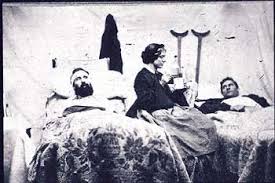 Tennessee Angels of Mercy, comforted and ministered, the sick, wounded and dying soldiers, bringing the Grace of a Woman’s Soft Touch, relieving the unbearable suffering of the bed ridden during the Civil War. Hospitals in Nashville and Gallatin were, at all times, in the most perfect order. Still, in the field, and often in the cities, cut off as Nashville and Murfreesboro sometimes were, the men suffered from the want of many little things. In Tennessee there were three ministering angels, who had left all the luxuries of a home, attending to the wounded. They had volunteered as nurses, traveled to Tennessee, to render all the aid they could to our country’s noble defenders. Indiana should remember the names of Miss Bates, Miss Cathcart, and Mrs. Ketchum. Miss Louisa May Alcott, of Boston, who had been administering to the wants of the sick and wounded, wrote of her growing personal relationship with a severely wounded soldier,
Tennessee Angels of Mercy, comforted and ministered, the sick, wounded and dying soldiers, bringing the Grace of a Woman’s Soft Touch, relieving the unbearable suffering of the bed ridden during the Civil War. Hospitals in Nashville and Gallatin were, at all times, in the most perfect order. Still, in the field, and often in the cities, cut off as Nashville and Murfreesboro sometimes were, the men suffered from the want of many little things. In Tennessee there were three ministering angels, who had left all the luxuries of a home, attending to the wounded. They had volunteered as nurses, traveled to Tennessee, to render all the aid they could to our country’s noble defenders. Indiana should remember the names of Miss Bates, Miss Cathcart, and Mrs. Ketchum. Miss Louisa May Alcott, of Boston, who had been administering to the wants of the sick and wounded, wrote of her growing personal relationship with a severely wounded soldier,
 “One evening I found a lately emptied bed occupied by a large, fair man, with a fine face, and the serenest eyes I ever met. One of the earlier comers had often spoken of a friend who had remained behind, that those apparently worse wounded than himself might reach a shelter first. It seemed a David and Jonathan sort of friendship. The man fretted for his mate, and was never tired of praising John, his courage, sobriety, self-denial, and unfailing kindliness of heart—always winding up with—”He’s an out-and-out fine feller, ma’am; you see if he aint.” I had some curiosity to behold this piece of excellence, and, when he came, watched him for a night or two before I made friends with him; for, to tell the truth, I was afraid of the stately looking man, whose bed had to be lengthened to accommodate his commanding stature—who seldom spoke, uttered no complaint, asked no sympathy, but tranquilly observed all that went on about him; and, as he lay high upon his pillows, no picture of dying statesman or warrior was ever fuller of real dignity than this Virginia blacksmith.
“One evening I found a lately emptied bed occupied by a large, fair man, with a fine face, and the serenest eyes I ever met. One of the earlier comers had often spoken of a friend who had remained behind, that those apparently worse wounded than himself might reach a shelter first. It seemed a David and Jonathan sort of friendship. The man fretted for his mate, and was never tired of praising John, his courage, sobriety, self-denial, and unfailing kindliness of heart—always winding up with—”He’s an out-and-out fine feller, ma’am; you see if he aint.” I had some curiosity to behold this piece of excellence, and, when he came, watched him for a night or two before I made friends with him; for, to tell the truth, I was afraid of the stately looking man, whose bed had to be lengthened to accommodate his commanding stature—who seldom spoke, uttered no complaint, asked no sympathy, but tranquilly observed all that went on about him; and, as he lay high upon his pillows, no picture of dying statesman or warrior was ever fuller of real dignity than this Virginia blacksmith.
A most attractive face he had, framed in brown hair and beard, comely featured and full of vigor, as yet unsubdued by pain, thoughtful, and often beautifully mild, while watching the afflictions of others, as if entirely forgetful of his own. His mouth was firm and grave, with plenty of will and courage in its lines, but a smile could make it as sweet as any woman’s; and his eyes were child’s eyes, looking one fairly in the face, with a clear, straightforward glance, which promised well for such as placed their faith in him. He seemed to cling to life as if it were rich in duties and delights, and he had learned the secret of content. The only time I saw his composure disturbed was when my surgeon brought another to examine John, who scrutinized their faces with an anxious look, asking of the elder: “Do you think I shall pull through, sir?” “I hope so, my man.” And, as the two passed on, John’s eyes followed them with an intentness which would have won a clearer answer from them had they seen it. A momentary shadow flitted over his face; then came the smile of serenity, as if, in that brief eclipse, he had acknowledged the existence of some hard futurity, and, asking nothing, yet hoping all things, left the issue in God’s hand, with that submission which is true piety.
At night, as I went my rounds with the surgeon, I happened to ask which man in the room probably suffered the most, and, to my great surprise, he glanced at John.
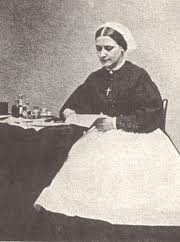 “Every breath he draws is like a stab; for the ball pierced the left lung, broke a rib, and did no end of damage here and there; so the poor lad can find neither forgetfulness nor ease, because he must lie on his wounded back or suffocate. It will be a hard struggle, and a long one, for he possesses great vitality; but even his temperate life can’t save him. I wish it could.”
“Every breath he draws is like a stab; for the ball pierced the left lung, broke a rib, and did no end of damage here and there; so the poor lad can find neither forgetfulness nor ease, because he must lie on his wounded back or suffocate. It will be a hard struggle, and a long one, for he possesses great vitality; but even his temperate life can’t save him. I wish it could.”
“You don’t mean he must die, Doctor?”
“Bless you, there is not the slightest hope for him, and you’d better tell him so before long—women have a way of doing such things comfortably; so I leave it to you. He won’t last more than a day or two at furthest.”
I could have sat down on the spot and cried heartily, if I had not learned the propriety of bottling up one’s tears for leisure moments. Such an end seemed very hard for such a man, when half a dozen worn-out, worthless bodies round him were gathering up the remnants of wasted lives, to linger on for years, perhaps burdens to others, daily reproaches to themselves. The army needed men like John, earnest, brave, and faithful, fighting for liberty and justice, with both heart and hand—a true soldier of the Lord. I could not give him up so soon, or think with any patience of so excellent a nature robbed of its fulfillment, and blundered into eternity by the rashness or stupidity of those at whose hands so many lives may be required. It was an easy thing for Dr. P—— to say, “Tell him he must die,” but a cruelly hard thing to do, and by no means as “comfortable” as he politely suggested. I had not the heart to do it then, and privately indulged the hope that some change for the better might take place, in spite of gloomy prophesies, so rendering my task unnecessary.
After that night, an hour of each evening that remained to him was devoted to his ease or pleasure. He could not talk much, for breath was precious, and he spoke in whispers; but from occasional conversations I gleaned scraps of private history, which only added to the affection and respect I felt for him. Once he asked me to write a letter, and, as I settled with pen and paper, I said, with an irrepressible glimmer of female curiosity, “Shall it be addressed to mother or wife, John?”
“Neither, ma’am: I’ve got no wife, and will write to mother, myself, when I get better. Did you think I was married because of this?” he asked, touching a plain gold ring he wore, and often turned thoughtfully on his finger when he lay alone.
“Partly that, but more from a settled sort of look you have—a look young men seldom get until they marry.”
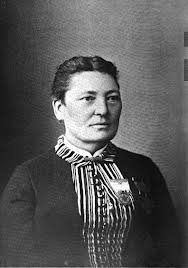 “I don’t know that; but I’m not so very young, ma’am—thirty in May, and have been what you might call settled these ten years, for mother’s a widow. I’m the oldest child she has, and it wouldn’t do for me to marry till Lizzie has a home of her own, and Laurie has learned his trade; for we’re not rich, and I must be father to the children, and husband to the dear old woman, if I can.”
“I don’t know that; but I’m not so very young, ma’am—thirty in May, and have been what you might call settled these ten years, for mother’s a widow. I’m the oldest child she has, and it wouldn’t do for me to marry till Lizzie has a home of her own, and Laurie has learned his trade; for we’re not rich, and I must be father to the children, and husband to the dear old woman, if I can.”
“No doubt you are both, John; yet how came you to go to the war, if you felt so? Wasn’t enlisting as bad as marrying?”
“No, ma’am, not as I see it; for one is helping my neighbor, the other pleasing myself. I went because I couldn’t help it. I didn’t want the glory or the pay; I wanted the right thing done, and the people said the men who were in earnest ought to fight. I was in earnest, the Lord knows; but I held off as long as I could, not knowing what was my duty. Mother saw the case, gave me her ring to keep me steady, and said ‘Go;’ so I went.”
A short story, and a simple one; but the man and the mother were portrayed better than pages of fine writing could have done it.
“Do you ever regret that you came, when you lie here suffering so much?”
“Never, ma’am. I haven’t helped a great deal, but I’ve shown I was willing to give my life, and perhaps I’ve got to; but I don’t blame any body, and if it was to do over again, I’d do it. I’m a little sorry I wasn’t wounded in front. It looks cowardly to be hit in the back; but I obeyed orders, and it don’t matter much in the end, I know.”
Poor John! it did not matter now, except that a shot in front might have spared the long agony in store for him. He seemed to read the thought that troubled me, as he spoke so hopefully when there was no hope, for he suddenly added:
“This is my first battle—do they think it’s going to be my last?”
“I’m afraid they do, John.”
It was the hardest question I had ever been called upon to answer; doubly hard with those clear eyes fixed upon mine, forcing a truthful answer by their own truth. He seemed a little startled at first, pondered over the fateful fact a moment, then shook his head, with a glance at the broad chest and muscular limbs stretched out before him.
“I’m not afraid; but it is difficult to believe all at once. I’m so strong, it does not seem possible for such a little wound to kill me.”
“Shall I write to your mother now?” I asked, thinking that these sudden tidings might change all plans and purposes; but they did not: for the man received the order of the Divine Commander to march with the same unquestioning obedience with which the soldier had received that of the human one, doubtless remembering that the first led him to life, the last to death.
“No, ma’am—to Laurie, just the same; he’ll break it to her best, and I’ll add a line to her, myself, when you get done.”
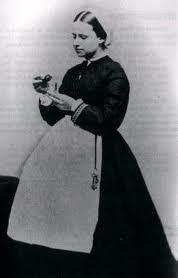 So I wrote the letter, which he dictated, finding it better than any I had sent, for, though here and there a little ungrammatical or inelegant, each sentence came to me briefly worded, but most expressive, full of excellent counsel to the boy, tenderly bequeathing “mother and Lizzie” to his care, and bidding him good-by in words the sadder for their simplicity. He added a few lines, with steady hand, and, as I sealed it, said, with a patient sort of sigh, “I hope the answer will come in time for me to see it.” Then, turning away his face, he laid the flowers against his lips, as if to hide some quiver of emotion at the thought of such a sudden sundering of all the dear home ties.
So I wrote the letter, which he dictated, finding it better than any I had sent, for, though here and there a little ungrammatical or inelegant, each sentence came to me briefly worded, but most expressive, full of excellent counsel to the boy, tenderly bequeathing “mother and Lizzie” to his care, and bidding him good-by in words the sadder for their simplicity. He added a few lines, with steady hand, and, as I sealed it, said, with a patient sort of sigh, “I hope the answer will come in time for me to see it.” Then, turning away his face, he laid the flowers against his lips, as if to hide some quiver of emotion at the thought of such a sudden sundering of all the dear home ties.
Those things had happened two days before. Now John was dying, and the letter had not come. I had been summoned to many death-beds in my life, but to none that made my heart ache as it did then, since my mother called me to watch the departure of a spirit akin to this, in its gentleness and patient strength. As I went in, John stretched out both his hands.
“I knew you’d come! I guess I’m moving on, ma’am.”
He was, and so rapidly that, even while he spoke, over his face I saw the gray veil falling that no human hand can lift. I sat down by him, wiped the drops from his forehead, stirred the air about him with the slow wave of a fan, and waited to help him die. He stood in sore need of help, and I could do so little; for, as the doctor had foretold, the strong body rebelled against death, and fought every inch of the way, forcing him to draw each breath with a spasm, and clench his hands with an imploring look, as if he asked, “How long must I endure this, and be still?” For hours he suffered, without a moment’s respite or a moment’s murmuring. His limbs grew cold, his face damp, his lips white, and again and again he tore the covering off his breast, as if the lightest weight added to his agony; yet, through it all, his eyes never lost their perfect serenity, and the man’s soul seemed to sit therein, undaunted by the ills that vexed his flesh.
One by one the men awoke, and round the room appeared a circle of pale faces and watchful eyes, full of awe and pity; for, though a stranger, John was beloved by all. Each man there had wondered at his patience, respected his piety, admired his fortitude, and now lamented his hard death; for the influence of an upright nature had made itself deeply felt, even in one little week. Presently, the Jonathan who so loved this comely David came creeping from his bed for a last look and word. The kind soul was full of trouble, as the choke in his voice, the grasp of his hand betrayed; but there were no tears, and the farewell of the friends was the more touching for its brevity.
“Old boy, how are you?” faltered the one.
“Most through, thank heaven!” whispered the other.
“Can I say or do any thing for you, anywheres?” “Take my things home, and tell them that I did my best.”
“I will! I will!”
“Good-by, Ned.”
“Good-by, John; good-by!”
They kissed each other tenderly as women, and so parted; for poor Ned could not stay to see his comrade die. For a little while there was no sound in the room but the drip of water from a pump or two, and John’s distressful gasps, as he slowly breathed his life away. I thought him nearly gone, and had laid down the fan, believing its help no longer needed, when suddenly he rose up in his bed, and cried out, with a bitter cry, that broke the silence, sharply startling every one with its agonized appeal, “For God’s sake, give, me air!”
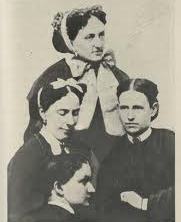 It was the only cry of that pain or death had wrung from him, the only boon he had asked, and none of us could grant it, for all the airs that blow were useless now. Dan flung up the window; the first red streak of dawn was warming the gray east, a herald of the coming sun. John saw it, and, with the love of light which lingers in us to the end, seemed to read in it a sign of hope, of help, for over his whole face broke that mysterious expression, brighter than any smile, which often comes to eyes that look their last. He laid himself down gently, and stretching out his strong right arm, as if to grasp and bring the blessed air to his lips in fuller flow, lapsed into a merciful unconsciousness, which assured us that for him suffering was forever past.
It was the only cry of that pain or death had wrung from him, the only boon he had asked, and none of us could grant it, for all the airs that blow were useless now. Dan flung up the window; the first red streak of dawn was warming the gray east, a herald of the coming sun. John saw it, and, with the love of light which lingers in us to the end, seemed to read in it a sign of hope, of help, for over his whole face broke that mysterious expression, brighter than any smile, which often comes to eyes that look their last. He laid himself down gently, and stretching out his strong right arm, as if to grasp and bring the blessed air to his lips in fuller flow, lapsed into a merciful unconsciousness, which assured us that for him suffering was forever past.
As we stood looking at him, the ward-master handed me a letter, saying it had been forgotten the night before. It was John’s letter, come just an hour too late to gladden the eyes that had looked and longed for it so eagerly—yet he had it; for after I had cut some brown locks for his mother, and taken off the ring to send her, telling how well the talisman had done its work, I kissed this good son for her sake, and laid the letter in his hand, still folded as when I drew my
These Tennessee Angels of Mercy, were truly some of the unsung heroes of the Civil War. The Woman’s Soft Touch that they offered, their soothing and comforting words, the soft caress or a cloth to the fevered brow, reminded the young men of the comforts and love of their families at home, some of the boys would heal, but many would not.
Bummer

